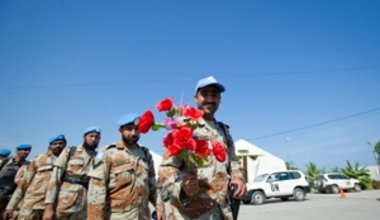Forensics Training for Human Rights Investigators
Dili, 23 August 2010 - "Forensic science helps the investigation, interpretation and development of justice", explained forensic pathologist Dr Nural Islam to the 14 members of staff from the national human rights institute The Provedoria of Human Rights and Justice (PDHJ) who attended his training session.
The three-day course, run by UNDP, was designed to help members of the human rights investigations team get to grips with the basics of forensics.
"Around 60% of total complaints made to the PDHJ relate to its human rights mandate. Since 2005 the PDHJ has received over 250 complaints on human rights violations", said Alison Ryan, the project manager for UNDP.
For the human rights investigators from PDHJ it is very important that they have an awareness of different forensic science techniques and can apply this knowledge in their evidence gathering and analysis.
Naasson Sarmento is one of the human rights investigators at PDHJ. He said this introduction to forensics has been invaluable for his work:
"I am regularly given medical reports from cases under investigation. Until now it has been incredibly difficult to understand the content and to interpret the results. Now I can understand the forensic terminology and know what follow-up questions I need to ask."
It is also important that the PDHJ staff know how to collect and document evidence when they are called to the scene of an incident, for instance taking accurate photos and measuring injuries.
This is vital information for any future investigation.
Karlheinz Gortano is UNDP's Investigation Mentor, working to increase the capacity of the staff at PDHJ:
"The PDHJ investigators had a case where a member of the public accused a police officer of assaulting them.
Unfortunately the bruising was not photographed properly at the time of the complaint. That obviously caused huge problems later on in the investigation once the physical evidence had faded".
Another of the trainees, Paulo Ribeiro, who is head of PDHJ's Oecussi office, believed this training to be especially helpful to those members of staff posted in the districts:
"As investigators in the field we often find it difficult to persuade people to be examined in a hospital. Now we have the skills to preserve and collect evidence when necessary".
The course included a visit to the National Hospital to view the facilities available to the forensics department. Plus a presentation from one of the Cuban doctors regarding the autopsy procedure for suspicious deaths. In the last 10 years there have been over 1,000 autopsy cases in Timor-Leste.
However, Dr Nural Islam, who is the forensic pathologist with the UN's Serious Crimes Investigation Team, emphasized to the PDHJ staff that forensics is not just about cases involving a death. Collecting trace evidence, for example from a rape victim, can help to identify an assailant and bring them to justice.
The Acting Provedor, Dr Rui Pereira dos Santos, welcomed the opportunity for his staff to attend the course:
"This training is important because it highlights the power of forensics, and demonstrates how the practical application of this science can help PDHJ perform its role as Timor-Leste's independent national human rights organization".
 UN
UN United Nations Peacekeeping
United Nations Peacekeeping




